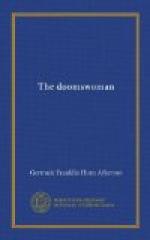The great house of the Iturbi y Moncadas, erected in the first years of the century, was built about three sides of a court, measuring one hundred feet each way. Like most of the adobes of its time, it had but one story. A wide pillared corridor, protected by a sloping roof, faced the court, which was as bare and hard as the floor of a ball-room. Behind the dwelling were the manufactories and huts of the Indian retainers. Don Guillermo Iturbi y Moncada was the magnate of the South. His ranchos covered four hundred thousand acres; his horses and cattle were unnumbered. His Indians, carpenters, coopers, saddlers, shoemakers, weavers, manufacturers of household staples, supplied the garrison and town with the necessaries of life; he also did a large trading business in hides and tallow. Rumor had it that in the wooden tower built against the back of the house he kept gold by the bushel-basketful; but no one called him miser, for he gave the poor of the town all they ate and wore, and kept a supply of drugs for their sick. So beloved and revered was he that when earthquakes shook the town, or fires threatened it from the hills, the poor ran in a body to the court-yard of Casa Grande and besought his protection. They never passed him without saluting to the ground, nor his house without bending their heads. And yet they feared him, for he was an irascible old gentleman at times, and thumped unmercifully when in a temper. Chonita, alone, could manage him always.
When I returned to Santa Barbara with Chonita after her visit to Monterey, the yellow fruit hung in the padres’ orchard, the grass was burning brown, sky and water were the hard blue of metal.
The afternoon of our arrival, Don Guillermo, Chonita, and I were on the long middle corridor of the house: in Santa Barbara one lived in the air. The old don sat on the long green bench by the sala door. His heavy, flabby, leathery face had no wrinkles but those which curved from the corners of the mouth to the chin. The thin upper lip was habitually pressed hard against the small protruding under one, the mouth ending in straight lines which seemed no part of the lips. His small slanting eyes, usually stern, could snap with anger, as they did to-day. The nose rose suddenly from the middle of his face; it might have been applied by a child sculpturing with putty; the flat bridge was crossed by erratic lines. A bang of grizzled hair escaped from the black silk handkerchief wound as tightly as a turban about his head. He wore short clothes of dark brown cloth, the jacket decorated with large silver buttons, a red damask vest, shoes of embroidered deer-skin, and a cravat of fine linen.
Chonita, in a white gown, a pale-green reboso about her shoulders, her arms crossed, her head thoughtfully bent forward, walked slowly up and down before him.
“Holy God!” cried the old man, pounding the floor with his stick. “That they have dared to arrest my son!—the son of Guillermo Iturbi y Moncada! That Alvarado, my friend and thy host, should have permitted it!”




